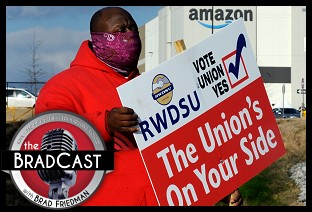 The accountability train and unionization train are both chugging forward on today's BradCast. So, that's a good thing! And we've also got a news-packed catch-up episode of the Green News Report following our week off last week. [Audio link to full show is posted below this summary.]
The accountability train and unionization train are both chugging forward on today's BradCast. So, that's a good thing! And we've also got a news-packed catch-up episode of the Green News Report following our week off last week. [Audio link to full show is posted below this summary.]
First up, after losing at the U.S. District Court level, Donald Trump had his day before a three-judge panel at the D.C. Circuit Court of Appeals on Tuesday. He is still attempting to block the release of his White House documents related to the attack on the U.S. Capitol which he incited on January 6th in his desperate, last ditch effort to steal the 2020 election. The former President is claiming "executive privilege" to block the release of hundreds of documents, even though he is no longer President or, as the lower court judge declared just weeks ago: "Presidents are not kings and plaintiff is not President". The current President, Joe Biden, has rejected Trump's plea to invoke executive privilege to block the release of the White House records subpoenaed by the bipartisan U.S. House Select Committee investigating the January 6 attack. We detail today's hearing and the arguments made in court on both sides.
Next, in related news, Trump's former Chief of Staff, Mark Meadows, has also been subpoenaed for both documents and testimony by the House Select Committee. Like Steve Bannon before him, Meadows previously ignored those subpoenas, also claiming "executive privilege". But now that Bannon has been indicted on two federal counts of Contempt of Congress for having done so, Meadows appears to be having second thoughts. The Committee now says Meadows is cooperating and plans to sit for a deposition. The question remains as to how much he will actually share with the Committee, which still seems prepared to pull the "Contempt" trigger against him, if necessary.
Also coming up in related accountability news this week: A likely Contempt referral for low-level DoJ Trump lackey Jeffrey Clark, who the disgraced former President almost elevated to Attorney General just prior to January 6th attack, due to his willingness to lie to state legislatures that the DoJ had found fraud in the 2020 election. They didn't. Now, Clark has been refusing fully respond to the Committee's subpoenas and will hopefully pay a price for it in the coming days.
Meanwhile, in some good labor news on Monday, the National Labor Relations Board (NLRB) found in favor of the Retail, Wholesale and Department Store Union (RWDSU)'s complaint that retail giant Amazon unlawfully gamed a unionization vote at its Bessemer, Alabama warehouse earlier this year. The NLRB has now ordered a re-vote for workers this Spring, after they voted against unionization by a 2 to 1 margin following months of pressure, weekly mandatory meetings with anti-union consultants, and all other forms or propaganda from the company during the initial election.
We're joined to discuss the (seemingly) good news from the NLRB by longtime labor historian, author and Distinguished Professor at UC Santa Barbara, NELSON LICHTENSTEIN, who joined us earlier this year to discuss the initial, now nullified unionization vote in Bessemer.
The colorful Lichtenstein explains the history of similar revotes, how frequently they are ordered by the federal labor board and what the odds are of the union winning this time, given the nearly 100 percent turnover in workers at the e-commerce giant's Alabama fulfillment center since the initial vote last March. He also explains that while the NLRB found a number of violations by the company, most of the egregious stuff they did to intimidate workers --- including one-on-one pressure sessions, anti-union propaganda posted in restrooms, offers of $1,000 to quit --- is almost all actually legal under current federal law.
"Once Amazon realized that probably the election would be overturned, they once again began to hold these captive audience meetings," says Lichtenstein. "These are meetings that are called by the company as they lecture to the workers why a union is a bad thing. They're really closer to Maoist re-education camps or Stalinist coercion methods than anything else. That is happening as we speak. Plus, Amazon is also keeping tabs on who the union activists are."
"All this," he argues, "points out that we really need a completely fundamental and radical change in the labor law. And more than just the labor law --- in the whole ethos that surrounds the idea of workers having rights, a voice, and having a union."
As it turns out, there is a new labor law, the Protect the Right to Organize (or PRO) Act, currently pending in Congress. "It would make illegal these captive audience meetings, which are very, very intimidating and authoritarian. It would eliminate that. It would also increase the penalties --- the financial penalties --- on companies for violating the labor law," notes Lichtenstein, the author of some 16 books related to these issues. "Right now, how much does Amazon have to pay for its violation of the labor law, which is creating this new election? Zero. The penalties are utterly trivial."
But the odds for passage of the PRO Act at this time remain long, Lichtenstein concedes. That said, he also notes that both the recently signed bipartisan infrastructure bill and Joe Biden's still-pending Build Back Better social safety net and climate action proposal have quite a few measures that support union labor.
As the "Great Resignation" continues for workers who are finding opportunities with better pay and benefits elsewhere, while the nation tries to move on from the pandemic, Lichtenstein (who recently compared the situation to opportunities for former slaves during the Civil War reconstruction era in a Washington Post op-ed) does suggest a potential way forward for anti-union companies that now face threats of being broken up by Biden's aggressive appointees at federal agencies such as the Federal Trade Commission.
"What needs to happen is this," Lichtenstein advises, "you need to make management come to the conclusion that the lesser evil, the lesser problem in their business model, would be recognizing the union rather than facing the ire of either an aroused public or government action." He tells us that Amazon, Facebook and other Silicon Valley firms are facing a "re-invigoration of anti-trust law in the Biden Administration," which he describes as "actually very pro-labor."
Those companies, he notes, could use some friends, "and an essential ally is labor." Lichtenstein details how such alliances prevented the breakup of big chain stores under anti-trust laws in the 1930s and even at General Motors in the 1950s. "Companies like that said to the labor movement, 'Well, we'll recognize you, if you let us stay big.' And that happened!"
Finally today, Desi Doyen jams about 20 minutes (or more!) of environmental news into our latest 6-minute Green News Report in hopes of getting us at least partially caught up on so much that we missed after taking the last week off for the holiday...
(Snail mail support to "Brad Friedman, 7095 Hollywood Blvd., #594 Los Angeles, CA 90028" always welcome too!)
|


 'Green News Report' 4/1/25
'Green News Report' 4/1/25
 Dems Step Up: Crawford Landslide in WI; Booker Makes History in U.S. Senate: 'BradCast' 4/2/25
Dems Step Up: Crawford Landslide in WI; Booker Makes History in U.S. Senate: 'BradCast' 4/2/25 Judge Dismisses Long-Running Challenge to GA's Unverifiable, Insecure E-Vote System: 'BradCast' 4/1/25
Judge Dismisses Long-Running Challenge to GA's Unverifiable, Insecure E-Vote System: 'BradCast' 4/1/25 'Green News Report' 4/1/25
'Green News Report' 4/1/25 Bad Court and Election News for Trump is Good News for America: 'BradCast' 3/31/25
Bad Court and Election News for Trump is Good News for America: 'BradCast' 3/31/25 Sunday 'Great Start!' Toons
Sunday 'Great Start!' Toons Vets Push Back at Trump, Musk Plan to Slash Health Care, 80K V.A. Jobs: 'BradCast' 3/27/25
Vets Push Back at Trump, Musk Plan to Slash Health Care, 80K V.A. Jobs: 'BradCast' 3/27/25 'Green News Report' 3/27/25
'Green News Report' 3/27/25 Signal Scandal Worsens for Trump, GOP; Big Dem Election Wins in PA: 'BradCast' 3/26
Signal Scandal Worsens for Trump, GOP; Big Dem Election Wins in PA: 'BradCast' 3/26 'Emptywheel' on Why Trump NatSec Team Should 'Resign in Disgrace' After Signal Chat Debacle: 'BradCast' 3/25/25
'Emptywheel' on Why Trump NatSec Team Should 'Resign in Disgrace' After Signal Chat Debacle: 'BradCast' 3/25/25 'Green News Report' 3/25/25
'Green News Report' 3/25/25 USPS 'Belongs to the People, Not the Billionaires': 'BradCast' 3/24/25
USPS 'Belongs to the People, Not the Billionaires': 'BradCast' 3/24/25 Sunday 'Suddenly Conceivable' Toons
Sunday 'Suddenly Conceivable' Toons 'Green News Report' 3/20/25
'Green News Report' 3/20/25 We're ALL Voice of America Now: 'BradCast' 3/20/25
We're ALL Voice of America Now: 'BradCast' 3/20/25 What Trump's 'Timber Production Expansion' Means (and Costs): 'BradCast' 3/19/25
What Trump's 'Timber Production Expansion' Means (and Costs): 'BradCast' 3/19/25 Courts Largely Holding Against Trump, Musk Lawlessness: 'BradCast' 3/18/25
Courts Largely Holding Against Trump, Musk Lawlessness: 'BradCast' 3/18/25 Chief VOA Reporter on Outlet Falling Silent First Time Since 1942: 'BradCast' 3/17/25
Chief VOA Reporter on Outlet Falling Silent First Time Since 1942: 'BradCast' 3/17/25 Trump EPA Unveils Plans to Endanger, Sicken Americans: 'BradCast' 3/13/25
Trump EPA Unveils Plans to Endanger, Sicken Americans: 'BradCast' 3/13/25 Trump Nixed Enforce-ment Against 100 Corp. Lawbreakers: 'BradCast' 3/12/25
Trump Nixed Enforce-ment Against 100 Corp. Lawbreakers: 'BradCast' 3/12/25 Bad Day for 'Strongmen': 'BradCast' 3/11
Bad Day for 'Strongmen': 'BradCast' 3/11 WI Election Could Flip Supreme Court Control, Musk Jumps In: 'BradCast' 3/10
WI Election Could Flip Supreme Court Control, Musk Jumps In: 'BradCast' 3/10
 VA GOP VOTER REG FRAUDSTER OFF HOOK
VA GOP VOTER REG FRAUDSTER OFF HOOK Criminal GOP Voter Registration Fraud Probe Expanding in VA
Criminal GOP Voter Registration Fraud Probe Expanding in VA DOJ PROBE SOUGHT AFTER VA ARREST
DOJ PROBE SOUGHT AFTER VA ARREST Arrest in VA: GOP Voter Reg Scandal Widens
Arrest in VA: GOP Voter Reg Scandal Widens ALL TOGETHER: ROVE, SPROUL, KOCHS, RNC
ALL TOGETHER: ROVE, SPROUL, KOCHS, RNC LATimes: RNC's 'Fired' Sproul Working for Repubs in 'as Many as 30 States'
LATimes: RNC's 'Fired' Sproul Working for Repubs in 'as Many as 30 States' 'Fired' Sproul Group 'Cloned', Still Working for Republicans in At Least 10 States
'Fired' Sproul Group 'Cloned', Still Working for Republicans in At Least 10 States FINALLY: FOX ON GOP REG FRAUD SCANDAL
FINALLY: FOX ON GOP REG FRAUD SCANDAL COLORADO FOLLOWS FLORIDA WITH GOP CRIMINAL INVESTIGATION
COLORADO FOLLOWS FLORIDA WITH GOP CRIMINAL INVESTIGATION CRIMINAL PROBE LAUNCHED INTO GOP VOTER REGISTRATION FRAUD SCANDAL IN FL
CRIMINAL PROBE LAUNCHED INTO GOP VOTER REGISTRATION FRAUD SCANDAL IN FL Brad Breaks PA Photo ID & GOP Registration Fraud Scandal News on Hartmann TV
Brad Breaks PA Photo ID & GOP Registration Fraud Scandal News on Hartmann TV  CAUGHT ON TAPE: COORDINATED NATIONWIDE GOP VOTER REG SCAM
CAUGHT ON TAPE: COORDINATED NATIONWIDE GOP VOTER REG SCAM CRIMINAL ELECTION FRAUD COMPLAINT FILED AGAINST GOP 'FRAUD' FIRM
CRIMINAL ELECTION FRAUD COMPLAINT FILED AGAINST GOP 'FRAUD' FIRM RICK SCOTT GETS ROLLED IN GOP REGISTRATION FRAUD SCANDAL
RICK SCOTT GETS ROLLED IN GOP REGISTRATION FRAUD SCANDAL VIDEO: Brad Breaks GOP Reg Fraud Scandal on Hartmann TV
VIDEO: Brad Breaks GOP Reg Fraud Scandal on Hartmann TV RNC FIRES NATIONAL VOTER REGISTRATION FIRM FOR FRAUD
RNC FIRES NATIONAL VOTER REGISTRATION FIRM FOR FRAUD EXCLUSIVE: Intvw w/ FL Official Who First Discovered GOP Reg Fraud
EXCLUSIVE: Intvw w/ FL Official Who First Discovered GOP Reg Fraud GOP REGISTRATION FRAUD FOUND IN FL
GOP REGISTRATION FRAUD FOUND IN FL


































